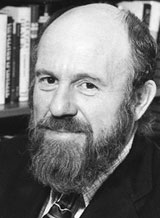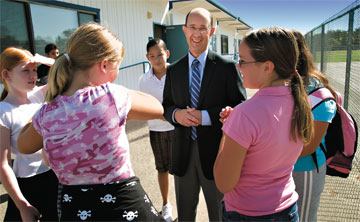Volume 27 · Number 2 · Winter 2010
Letters
Fee Increases
Although I understand the need for student fee increases proposed for the next two academic years — and applaud efforts to help offset the financial burden with additional financial aid — as a parent of a UC Davis student, I would like to ask UC regents for something in return: Guarantee the course offerings that students need to graduate in four years. My Aggie daughter is a very good student and has over several quarters been unable to get the prerequisite classes she needs to graduate on time. Availability of necessary classes, especially in majors that historically could be completed in four years, should be required before any fees are increased.
Butch Coyne
San José
Jacobs: Kind, Wise

Clyde Jacobs
I was saddened to read in the fall 2009 issue of the death of Professor Emeritus Clyde Jacobs. He was my major adviser when I came to Davis as a hayseed kid, a freshman, in 1957. I had pretensions of becoming a lawyer, and needed a lot more advice than I thought. His very insightful guidance set and kept me on the path that got me my very sound Davis education. The principle I gained from Professor Jacobs was that a lawyer should have a broad, rigorous education. In retrospect, he was absolutely right.
I also remember his extraordinary kindness and his generosity with his time. I’m having a wonderful time being a lawyer, and will always be grateful to Professor Jacobs for being instrumental in getting me here.
Michael Ford ’61
Fillmore
Anatomy Lab
Reading “Nothing Like the Real Thing” by Emily Dubina ’09 [fall 2009] brought back great memories. I also took “Human Anatomy Lab 101L” and was a head teaching assistant in winter 1997. I’m a physical therapist for Kaiser in South Sacramento, and it is one of the few classes I took at UC Davis that I continue to use daily. I am thrilled to hear that Douglas Gross is still teaching the course; it was one of my favorites, and I encourage all students to take it.
Erika Berkley Meredith ’98
Elk Grove
Editor’s note: Another reader asked if UC Davis accepts body donations for education and research. It does. For information, visit the Body Donation Program site.
‘Education for All’: Not the Solution
As a 31-year veteran of the teaching profession, I read your article about West Sacramento Early College Prep [“Education for All,” fall 2009]with ever-increasing wonder. Wow, I thought to myself, maybe they have found the magic formula! A charter school for everyone that really succeeds! But buried deep within the long article, in a paragraph that many people might have missed, was the fact that all students and parents must sign a behavior, attendance and grade contract, and violation of the contract results in expulsion from the school. So the UC Davis experiment has little to do with the real world after all. The children who are expelled from West Sacramento Early College Prep go back into noncharter schools, where state bureaucrats and politicians cluck over their standardized test scores as evidence of the failure of public schools, while charter schools get to gloat over their amazing achievements. Gimme a break.

Harold Levine, dean of the School of Education, talks with students at West Sacramento Prep. (Karin Higgins/UC Davis)
Elizabeth Ketelle, Cred. ’76
Garden Valley
Kudos to Levine
Thank you for the article on Harold Levine [dean of the School of Eduation]. His approach to education is very welcome. He is striving to prepare all young children to be able to go on to college, to see this as attainable, normal and desirable, and to teach them how to think critically, “to ask and answer interesting questions.” In many families where the adults did not go to college, the children do not see college as part of their future. It seems remote and foreign to them. We need more people like Harold Levine.
Alan Templeton ’82
Oakland
World War II Vets

George Allen
I can’t properly express my feelings after reading your [fall 2009] article on Walt Newman. He was a class act while at UC Davis. We both lived in West Hall and I, too, was an ROTC graduate. He was also vice president of the student body. I was a year behind him and followed him as vice president.
As an infantry commander in combat, he went through a lot and, I’m sure, deserves any award he re-ceived. A lot of his ROTC classmates also served in the European Theater of Operations, and a lot of us were wounded; one of those who didn’t make it home was the 1943 class president and student body president, George Allen, a wonderful friend.
My best wishes and congratulations to Walt.
Robert Herrick ’43
Bakersfield
Editor’s note: In addition to Allen, another 36 Aggies died in World War II.
Bigotry and age
Dave Johnson objected (fall 2009) to a study by Professor Jeffrey Sherman (reported in summer 2009), which explained that whites’ but not blacks’ racial bias increases with age because whites lose their “ability to regulate their thoughts and behavior.” But either only whites lose their ability to regulate their thoughts and behavior (which is implausible and hasn’t been shown), or blacks also lose their ability to regulate their thoughts and behavior but don’t have any increase in racial bias with age (which casts doubt on Sherman’s explanation). I agree with Johnson, this study needs to go back to the drawing board.
Craig Erb ’68
Santa Clara
Given the increased diversity of the population of California, where no one racial or ethnic group constitutes a majority, it is somewhat odd that the study addressed only whites, with a slight reference to blacks. It isn’t simply a matter of white and black attitudes. Biased behavior among any racial group is a major concern for all. Why didn’t the study include Latinos, Asians and Native Americans, as well as blacks and whites?
Jean James ’70
Citrus Heights
Population Growth
“How Green Is Our Valley” (Fall 2009), brought out that the population of California’s Central Valley is expected to rise from 7 million people to 12 million in the next 30 years. I’ve read that the world population is expected to be 9 billion around 2050. Part of maintaining a sustainable, green and healthy planet depends on people using intelligence, wisdom, humility and brotherly love in the number of children they choose to have. There is no law that says couples must have children.
As couples choose to have a maximum of two children and/or adopt, we all might well experience a greater sense of peace, calm, security and better health. This would include our precious planet.
Jackie Leonard-Dimmick ’73
Atherton
Narrow Research
Your slanted piece on the Cash for Clunkers program [fall 2009] focuses on the worst part of what universities can be engaged in today: singling out a piece of a program and analyzing it against a moving standard (projections). This type of narrow research and reporting of results does little to help the world move toward a healthier and more sustainable economy. Instead of breaking systems down to their constituent parts for analysis, universities should be leading the way in looking at the complex and messy “big picture.”
Phil Zastrow
Arcata
